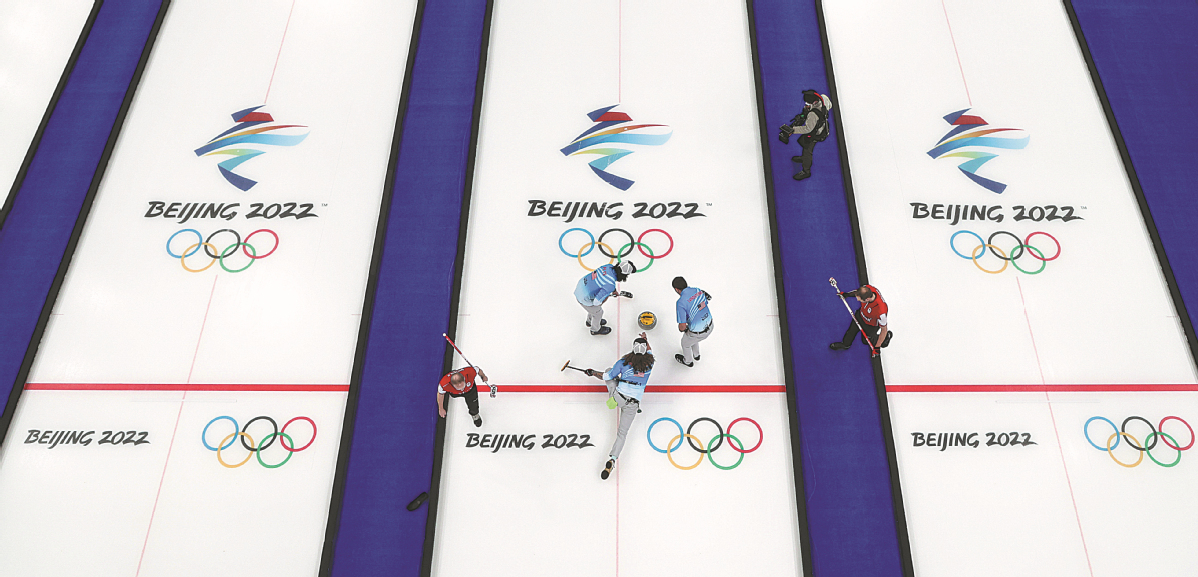
More international events will be introduced to the Ice Cube, aka the National Aquatics Center, over the coming years after the venue hosted the curling competitions of Beijing 2022 to widespread acclaim. [Photo/Xinhua]
Venue becomes sport's new base in China after wowing world at Beijing 2022
Proving a huge success as a double-duty Olympic venue, the National Aquatics Center, aka the "Ice Cube", during the Winter Games, will continue to drive curling's growth in China beyond Beijing 2022.
Keen to build on the buzz generated by the 19-day Olympic program, a new three-party agreement signed on Friday will focus energies on promoting the sport in China after the Games.
The World Curling Federation, the Chinese Curling Association and Beijing State-owned Assets Management Co, owner of the Ice Cube, will introduce more international events to the venue and jointly develop a World Curling Academy Training Center at a facility used for training at the Olympics.
Programs to train more event operations staff and curling coaches with input from the WCF will also be launched in China and hosted by the aquatics center, according to Kate Caithness, president of the WCF.
"China has the potential to be one of the biggest curling nations in the world and the coaches and officials who will be trained at this center will help build and promote the foundations of that growth," Caithness said during the agreement signing ceremony at the aquatics center on Friday.
"The confirmation of this new facility as a World Curling Academy Training Center is the key and I very much applaud the commitment of our Chinese partners to sign this deal."
Built for swimming, diving and water polo at the 2008 Summer Games, the aquatics center, known as the "Water Cube" back then, was transformed into a curling venue for the 2022 Olympic and Paralympic Winter Games-an innovative undertaking that involved filling the pool with retractable steel structures.
The whole transformation is reversible, turning the center into a multifunctional facility.
As one of six 2008 projects in downtown Beijing repurposed to host competition and non-competition events at Beijing 2022, the Ice Cube has earned huge praise from the world's athletes at the Winter Games.
"The venue here is fantastic. The Ice Cube. Well done, China. Really good job. It's so nice to play here. It's one of the nicest venues we've ever played in our lives," Canada's Olympic champion curler John Morris said after a mixed doubles game on Feb 4.
"I wanted to say how special it feels for us. It's my first time in Beijing and it feels really, really awesome to play in such a wonderful venue."
However, the idea of setting sheets of ice above a hollow swimming pool for curling, a sport that requires an extremely even and stable field of play, had raised some eyebrows from the international governing body at the very beginning.
"Obviously, you think, how could you change a swimming pool into a curling venue," Caithness admitted. "In our sport we must have a very level floor. We cannot have any movement."
After visiting Beijing regularly in the lead-up to the Games to witness the transformation and observe the successful operation of test events, Caithness and her colleagues quickly got behind the sustainable project.
"To bring this iconic Water Cube into the Ice Cube has been really technically difficult and they have done an outstanding job," said Caithness, who also attended swimming competitions at the same venue during the 2008 Summer Games.
"They have managed to do the best floor we've ever had. So I cannot compliment the Chinese people enough. We've had no complaints from the athletes. They love the venue. So all is good."
Built at the underground space to the south of the aquatics center's competition hall, the Ice Cube Ice Sports Center, a training facility during the Winter Olympics, will open to the public all year long and host workshop and training programs guided by the World Curling Academy as a new legacy of the dual Olympic venue, according to Beijing State-owned Assets Management Co.
"We will bring major curling competitions to China, build up professional, organizational and operational systems and train specialists in order to provide solid talent support for sustainable improvement of curling as a sport and as an industry," said Zhang Jie, general manager of the National Aquatics Center's operation team.


